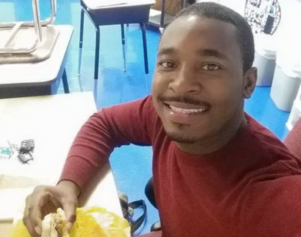
Sharif El-Mekki. Image courtesy of U.S. Department of Education.
It’s no secret that African-American and other nonwhite teachers make up just a small percentage of the nation’s educators. An even smaller percentage of those educators (2 percent, to be exact) are African-American males.
That’s why veteran Philadelphia teacher Sharif El-Mekki, who launched the Fellowship: Black Male Educators for Social Justice, is working to mobilize at least 1,000 Black American men to show up on the first day of school to serve as positive examples for city youths. By 2025, El-Mekki said he hopes to achieve an even loftier goal — grow the number of Philly’s Black male educators three times over.
“We just see all these holes in the pathway to divert people,” said El-Mekki, who also serves as principal of Mastery Charter School-Shoemaker. “If we have a high percentage of Black boys dropping out of our comprehensive high schools, that’s a leak. If we have folks not prepared for college, that’s a leak. Our Black boys aren’t being told, ‘You’re a great leader, why don’t you lead in a classroom?'”
The percentage of Black male teachers in Philadelphia was slightly better than the national percentage, but still lacking, according to Philly.com. Just 5 percent, or fewer than 400, of Philadelphia School District teachers were Black males. The disturbingly low number prompted El-Mekki to hold periodic meetings of African-American male educators, influence education policy and extend the pipeline of Black male teachers.
As student populations across the nation become more diverse, education experts have argued the importance of employing faculties that better reflect the diverse student bodies they educate everyday. U.S. Secretary of Education John King cited credible evidence showing that not only do African-American students benefit from having Black teachers in the classroom, but white students do as well.
“I encourage school and district leaders to work with their teachers and other staff members to develop a vision for how to make their campuses more inclusive by adopting proactive hiring processes, providing professional support, using a multicultural curriculum and offering cultural competence workshops for everyone,” King wrote in a piece for The Washington Post earlier this year. “The burden to end this tax shouldn’t fall only to the people already paying it.”
The “tax” King spoke of refers to the invisible burden carried by Black and other nonwhite teachers across the nation who are tasked with addressing several issues involving African-American students. These teachers, who again make up just 2 percent of the nation’s teaching force, are expected to act as school disciplinarians, under the assumption that they can better handle behavioral issues involving Black students, prep minority students for the racism they may face in the real world and serve as the spokesperson for cultural diversity.
“We need a diversity of voices, a diversity of thought, particularly around who makes decisions about our children,” said Will Hayes, a Fellowship member who works as principal of Mastery-East Camden Middle School in South Jersey.
So far, the Fellowship, which was born out of monthly meet-ups at 48th Street Grille in West Philadelphia, has convened five times and hosted a career fair, Philly.com reported. The nonprofit now boasts 50 paid members and has plans to implement chapters in 10 high schools across the city.
El-Mekki, whose work has caught the attention of Oprah Winfrey and President Obama, was selected by former U.S. Secretary of Education Arne Duncan in 2014 to be part of the nation’s first group of Principal Ambassador Fellows. The principal cited a 1992 incident in which he was shot following a pick-up football game as the reason he began working with youths who didn’t have opportunities.
There were “people who were oppressed and who were then oppressing others,” he said.
El-Mekki graduated from the Indiana University of Pennsylvania with a degree in criminal justice and went on to work as a counselor at the Youth Study Center after the shooting, according to Philly.com. He was later introduced to an alternate-route teacher-certification program and began his career as an educator.

